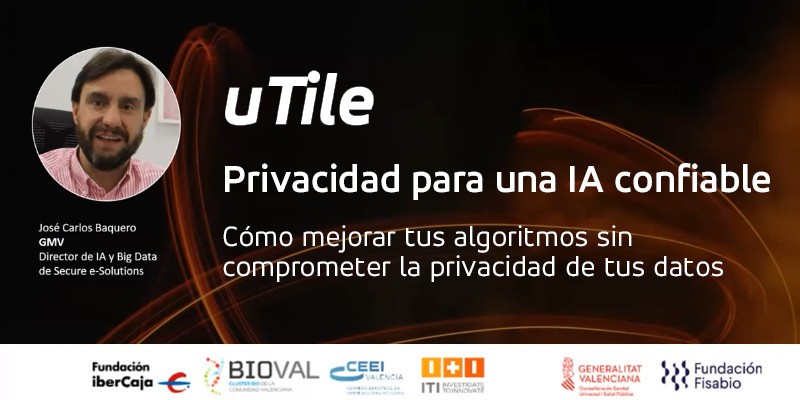Privacy for trustworthy AI in the 6th TIC Salud

The privacy of both personal and confidential data is crucial in any organization taking data-based decisions. The downside is that privacy policies might balk any advanced data analysis or data-based training of AI algorithms. This was one of the keynote messages of José Carlos Baquero, AI and Big Data Manager of GMV’s Secure e-Solutions sector, in his speech at TIC Salud, the health ICT event organized by the Bio Cluster of Valencia Region (BIOVAL) in collaboration with the IT Technology Institute (Instituto Tecnológico de Informática) and the European Center of Innovating Companies of Valencia (Centro Europeo de Empresas Innovadoras de Valencia).
On the artificial intelligence discussion panel Barquero argued that data represents the new black gold, and organizations are now mining and using this data for advanced analysis and machine learning to boost their business results. In these cases the benefits of applying technology to available information are clear. The trouble comes when, in certain projects, the goals in view call for the private data to be brought out of its original source. The health sector is a classic example.
In Baquero’s words, “patient data is strictly protected under the General Data Protection Regulation (GDPR) and Spain’s own data-protection and patient-autonomy laws”. If we want to compare health results in the course of any particular treatment or draw evidence-based conclusions, we find that “this personal data is stored in various information silos distributed among public and private hospitals, health centers, etc.”
Exchanging this data is a complicated process. Patient data privacy must be assured under GDPR and the policies within Spain are strict too. It is also difficult for health organizations to come by tools guaranteeing 100% data harmonization for research purposes in collaboration with other organizations. The clinical data of each health episode therefore remain stored in the so-called data silos of the hospital’s information systems. Even research at international level might turn out to be tricky because national bodies of law prevent the sharing of data outside each particular country.
This got us thinking at GMV. “What if the right balance could be struck between data privacy and the possibility of using this data to the benefit of one and all? Enter uTile PET (Privacy-Enhancing Technologies)”. We came up with “a technological solution to make these calculations securely and in privacy using advanced cryptographic methods on patients’ distributed data, without thereby exposing them to any privacy-threatening risk or moving them from the hospitals or health centers where they are kept. This allows research centers and the pharmaceutical industry to glean such crucial information as the survival rate: the value of biomarkers, prognoses, average patient age, etc., of clinical treatment without jeopardizing patient data privacy”, Baquero stressed.